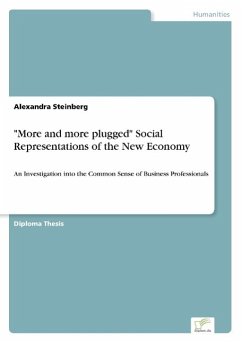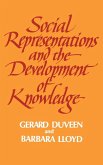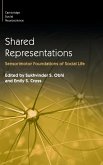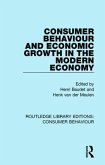Diploma Thesis from the year 2001 in the subject Psychology - Social Psychology, grade: 1,0, London School of Economics (unbekannt), language: English, abstract: Inhaltsangabe:Abstract:
This study set out to explore representations of the new economy amongst business professionals in Internet enabled business. Going beyond the new economy- hype , the study was aimed at understanding the ways that business professionals make sense of the contemporary economy. In doing so, a social psychological perspective was taken, allowing multiple realities to emerge.
Behavioural economists and economic psychologists conceptualisations of economic life are challenged. They hinge on the presumption that individuals act independently from their social environment and deviate as cognitive misers from a single legitimate economic rationality. By contrast, this study drew on a social constructionist framework. More specifically, it employed social representations theory (Moscovici, 1961/76; Moscovici, 1984), which rehabilitated common sense as a legitimate form of knowledge. The theory of social representations as a theory of knowledge proved as a sensitive and more sophisticated tool to analyse contemporary economy in its manifestations in professionals common sense. It is suggested to view the notion of common sense independently of role constellations.
Given this framework, this study took a snapshot of the contemporary representational field of the new economy amongst business professionals. Particularly, the study was focused on exploring the taken-for-granted and beliefs underpinning discourses and symbols.
Data from semi-structured interviews and an in-depth analysis of Web-sites highlighted new findings: Business professionals have constructed symbolic meaning centring around the notion of interaction. Economic and social beliefs were not separated: Interaction is the new economy. The new and seemingly unlimited digital connectivity was perceived as a challenge and triggered a symbolic creation of a new space - the faceless space of interaction. Meanings around the faceless space of interaction are constructed in strong contrast to physical proximity and shared experience in communities: the face-to-face space. From numerous interlocking discourses and images a core set of values emerged at the heart of the representational field, deeply embedded in professionals common sense. Representations of new technology, of business professionals skills and roles in the new economy, of space and time were informed by symbolic coping with the challenges posed by the faceless space. This was evident in situative tensions due to multi-modal interactivity and interaction with the other through a network of unlimited information exchange and reciprocity. Results suggested an early stage of maturity of representations. Anticipative accounts by interviewees suggested a further familiarisation process with interaction in the new context of faceless space.
A social constructionist framework has shed light on the very way business professionals think and feel about the new economy, and how they actively shape a common understanding of interaction, demonstrating their agency in symbolically integrating new forms of interaction into common sense. Economic beliefs are part and parcel of this common sense as a form of knowledge inherent to the fabric of daily contemporary life; thereby this study highlights the contribution that social psychology can make to an understanding of the economy.
Inhaltsverzeichnis:Table of Contents:
1.Introduction7
1.1The new economy-'hype'8
1.2Professionals in the new economy: the social sphere of Internet enabled business13
1.3The contemporary context14
2.Conceptual framework16
2.1A critique of behavioural economics and economic psychology16
2.2A social representational perspective on social knowledge...
Hinweis: Dieser Artikel kann nur an eine deutsche Lieferadresse ausgeliefert werden.
This study set out to explore representations of the new economy amongst business professionals in Internet enabled business. Going beyond the new economy- hype , the study was aimed at understanding the ways that business professionals make sense of the contemporary economy. In doing so, a social psychological perspective was taken, allowing multiple realities to emerge.
Behavioural economists and economic psychologists conceptualisations of economic life are challenged. They hinge on the presumption that individuals act independently from their social environment and deviate as cognitive misers from a single legitimate economic rationality. By contrast, this study drew on a social constructionist framework. More specifically, it employed social representations theory (Moscovici, 1961/76; Moscovici, 1984), which rehabilitated common sense as a legitimate form of knowledge. The theory of social representations as a theory of knowledge proved as a sensitive and more sophisticated tool to analyse contemporary economy in its manifestations in professionals common sense. It is suggested to view the notion of common sense independently of role constellations.
Given this framework, this study took a snapshot of the contemporary representational field of the new economy amongst business professionals. Particularly, the study was focused on exploring the taken-for-granted and beliefs underpinning discourses and symbols.
Data from semi-structured interviews and an in-depth analysis of Web-sites highlighted new findings: Business professionals have constructed symbolic meaning centring around the notion of interaction. Economic and social beliefs were not separated: Interaction is the new economy. The new and seemingly unlimited digital connectivity was perceived as a challenge and triggered a symbolic creation of a new space - the faceless space of interaction. Meanings around the faceless space of interaction are constructed in strong contrast to physical proximity and shared experience in communities: the face-to-face space. From numerous interlocking discourses and images a core set of values emerged at the heart of the representational field, deeply embedded in professionals common sense. Representations of new technology, of business professionals skills and roles in the new economy, of space and time were informed by symbolic coping with the challenges posed by the faceless space. This was evident in situative tensions due to multi-modal interactivity and interaction with the other through a network of unlimited information exchange and reciprocity. Results suggested an early stage of maturity of representations. Anticipative accounts by interviewees suggested a further familiarisation process with interaction in the new context of faceless space.
A social constructionist framework has shed light on the very way business professionals think and feel about the new economy, and how they actively shape a common understanding of interaction, demonstrating their agency in symbolically integrating new forms of interaction into common sense. Economic beliefs are part and parcel of this common sense as a form of knowledge inherent to the fabric of daily contemporary life; thereby this study highlights the contribution that social psychology can make to an understanding of the economy.
Inhaltsverzeichnis:Table of Contents:
1.Introduction7
1.1The new economy-'hype'8
1.2Professionals in the new economy: the social sphere of Internet enabled business13
1.3The contemporary context14
2.Conceptual framework16
2.1A critique of behavioural economics and economic psychology16
2.2A social representational perspective on social knowledge...
Hinweis: Dieser Artikel kann nur an eine deutsche Lieferadresse ausgeliefert werden.








